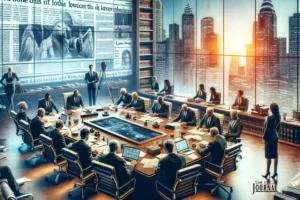Lucasfilm Faces Lawsuit Over Digital Resurrection in Rogue One
Disney subsidiary Lucasfilm is embroiled in a legal dispute over the digital recreation of actor Peter Cushing’s likeness in Rogue One: A Star Wars Story. The lawsuit challenges the company’s use of special effects to bring Cushing’s character, Grand Moff Tarkin, back to the screen years after the actor’s death.
5 Key Points
- Lucasfilm is being sued for recreating Peter Cushing’s image in Rogue One: A Star Wars Story.
- The lawsuit alleges Disney lacked permission to resurrect Cushing’s likeness digitally.
- Disney’s attempts to dismiss the case have been unsuccessful.
- The legal action involves claims against multiple parties, including Rogue One’s producer and Cushing’s estate executors.
- The case highlights the complex legal landscape surrounding digital image rights in film.
Lawsuit Details and Plaintiff’s Claims
Kevin Francis, a friend of the late Peter Cushing, initiated the legal action through his company Tyburn Film Productions. Francis asserts that a 1993 agreement with Cushing grants him the authority to approve any recreation of the actor’s image. This agreement, made just a year before Cushing’s death at 81, forms the crux of the plaintiff’s case.
The lawsuit extends beyond Lucasfilm, naming Rogue One producer Lunak Heavy Industries, the executors of Cushing’s estate, and Cushing’s agency Associated International Management as defendants. This broad scope underscores the complex web of relationships and agreements surrounding an actor’s image rights.
Lucasfilm’s Defense and Initial Response
Lucasfilm contends that it did not believe permission was necessary to recreate Cushing’s image, citing two main factors:
- Cushing’s original contract for the 1977 Star Wars film (later retitled Star Wars: Episode 4 – A New Hope).
- The nature of the special effects used in the recreation process.
In an apparent acknowledgment of potential issues, Lucasfilm paid approximately $37,000 to Cushing’s estate after being contacted by the actor’s agent regarding the digital resurrection. While this payment could potentially be seen as a good-faith effort, it did not prevent the current legal challenge.
Legal Proceedings and Judicial Perspective
Disney’s attempts to have the case dismissed have been unsuccessful. On September 9, 2024, Deputy High Court judge Tom Mitcheson rejected the appeal for dismissal, stating that the case should proceed to trial. Judge Mitcheson noted the issue’s complexity, saying, “I am also not persuaded that the case is unarguable to the standard required to give summary judgment or to strike it out.”
The judge’s comments highlight the evolving nature of law in this area: “In an area of developing law it is very difficult to decide where the boundaries might lie in the absence of a full factual enquiry.” This stance suggests that the case could set important precedents for using digital likenesses in film.
Broader Context in Star Wars Franchise
Using special effects to recreate or de-age actors is not unique to Cushing’s case within the Star Wars franchise. The practice has become increasingly common:
- Mark Hamill was digitally de-aged for his portrayal of Luke Skywalker in recent films.
- After her death in 2016, Carrie Fisher’s likeness as Princess Leia was recreated for Star Wars: Episode 9—The Rise of Skywalker.
These examples illustrate the franchise’s reliance on technology to maintain character continuity across its expansive timeline. They also underscore the potential for similar legal challenges in the future as the boundaries between actor performance and digital recreation become increasingly blurred.
As this case progresses, it will likely attract significant attention from the entertainment industry and legal scholars. The outcome could have far-reaching implications for using digital likenesses in film, potentially reshaping how studios approach the recreation of deceased actors’ images in future productions.
FAQ
Q: Who is suing Lucasfilm over the use of Peter Cushing’s image?
A: through his company Tyburn Film Productions, Kevin Francis is suing Lucasfilm.
Q: What is the basis of the lawsuit against Lucasfilm?
A: The lawsuit claims Lucasfilm lacked permission to recreate Peter Cushing’s image in Rogue One digitally.
Q: When did Peter Cushing pass away?
A: Peter Cushing died in 1994 at the age of 81.
Q: Has Disney tried to dismiss the case?
A: Yes, Disney has twice tried and failed to dismiss the case.
Q: What did the judge say about the case?
A: The judge stated the case should go to trial, noting the difficulty in deciding boundaries in this developing area of law.
Citations
Dinsdale, R. (2024, September 12). Lucasfilm Sued for Recreating Grand Moff Tarkin Actor Peter Cushing’s Image in Rogue One: A Star Wars Story. IGN. https://www.ign.com/articles/lucasfilm-sued-for-recreating-grand-moff-tarkin-actor-peter-cushings-image-in-rogue-one-a-star-wars-story






